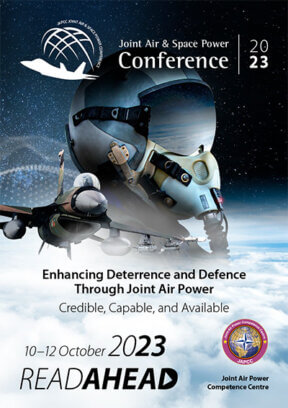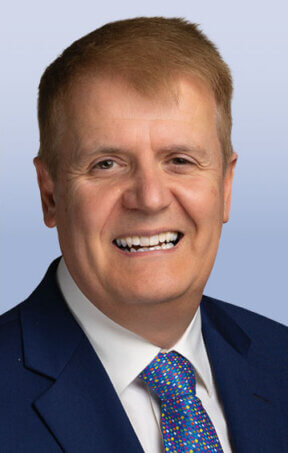Esteemed Colleagues,
I am honoured to serve as your Moderator for the JAPCC Conference once again. For the second year in a row, we will convene amidst a major war being fought on the European mainland, right on NATO’s borders.
Two years ago – a few months before Putin’s illegal invasion of Ukraine – the then JAPCC Director, General Harrigian, spoke about how such an act should be a ‘forcing function’ for our governments and for NATO itself. The actions taken so far to support Ukraine and defend NATO nations have had significant effect and, after some initial hesitancy from some NATO members, have shown commendable unity and solidarity.
One great danger is that, as the war continues deep into its second year, a form of ‘compassion fatigue’ may affect public opinion and, in turn, the resolve of some NATO nations. The resolve of the Ukrainian people is unshakeable and as strong as ever. However, they continue to suffer losses of both their combatants and non-combatants and the destruction of their towns, cities, and critical infrastructure. Whilst the Russian invaders have substantial human resources and show an apparent willingness (even carelessness) to expend them in ill-considered offensives, Ukraine cannot afford to lose its men, women and children in similar numbers.
As I write this in Spring 2023, one positive move to address this first danger is the International Criminal Court’s (ICC) decision to issue arrest warrants for Mr Vladimir Vladimirovich Putin and Ms Maria Alekseyevna Lvova-Belova for the war crime of unlawful deportation of the population (children) and that of unlawful transfer of population (children) from occupied areas of Ukraine to the Russian Federation (under articles 8 (2) (a) (vii) and 8 (2) (b) (viii) of the Rome Statute). Whilst some might see the ICC’s move as merely symbolic, I believe this may have more far-reaching consequences. Those consequences include the reaction of actors and nations who still feel able to conduct ‘business as usual’ with Putin’s regime. Nor should we discount the impact of ‘mere symbolism’.
The second danger – that of the attrition of Ukraine and its people – can, at present, only be addressed by ensuring sure that Ukrainian forces have the equipment and training to fight smarter and have some degree of decisive overmatch against their aggressors. By so doing, NATO nations also enhance their own deterrence and defence. Nevertheless, make no mistake; a ‘long war’ serves Putin far more than it suits Ukraine and NATO. However, a recent article in The Economist (23 April) makes a far more subtle point:
‘The question is not so much whether Russia can endure an even longer war of attrition (it can), but whether it can support the sort of intensification of the conflict Russia will probably need to transform its prospects on the battlefield. That looks almost impossible.’
Western sanctions are having a noticeable effect. Modern tanks need sophisticated optics and bearing assemblies. A recent Forbes.com article explains this well and cites as an example:
‘A new T-72BM3 or T-90M tank requires modern optics, and those optics normally come from France. When Paris tightened its sanctions, it deprived Russian industry of the components it needs for the new tanks’ Sosna-U digital sights.’
Vladimir Putin has proved to be NATO’s greatest recruiting sergeant – as the recent accession of Finland and (pending accession of) Sweden shows. How ironic that the unprovoked invasion of Ukraine – said to be (in part) to stop the encroachment of NATO on Russia – has prompted two previously non-aligned countries to seek NATO membership and add another 800 miles of NATO bordering on Russia. I welcome NATO’s two newest members and acknowledge their contribution to NATO’s enhanced deterrence and defence.
Finally, I draw your attention to the carefully curated collection of articles in this Read Ahead. They set the scene for our conference and provide an excellent introduction to the panel discussions.
I look forward to meeting you all in October!









